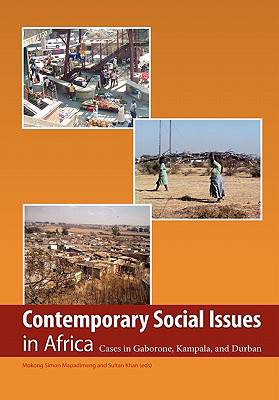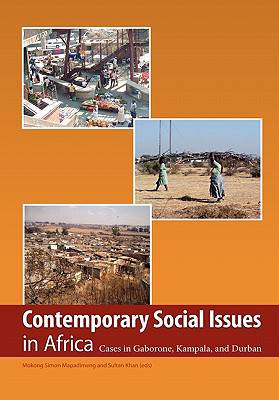
- Afhalen na 1 uur in een winkel met voorraad
- Gratis thuislevering in België vanaf € 30
- Ruim aanbod met 7 miljoen producten
- Afhalen na 1 uur in een winkel met voorraad
- Gratis thuislevering in België vanaf € 30
- Ruim aanbod met 7 miljoen producten
Zoeken
Contemporary Social Issues in Africa. Cases in Gaborone, Kampala, and Durban
Cases in Gaborone, Kampala, and Durban
Mokong Simon Mapadimeng, Sultan Khan
Paperback | Engels
€ 54,45
+ 108 punten
Omschrijving
This volume comprises of incisive and perceptive essays that analyse social issues in contemporary post-colonial and post-apartheid Africa using cases in three African cities - Durban in South Africa, Gaborone in Botswana, and Kampala in Uganda. It is an outcome of collaboration by colleagues from Universities of Kwazulu-Natal, Makerere, Botswana and Dar es Salaam to establish a structured, collaborative scholarly partnership programme. The partnership is called Rethinking Africa Programme, which is consistent with the 21st century ideals of Africa's renewal. Its key objective is to re-think Africa through academic and research initiatives sensitive to our own experiences as Africans, as well as through a critical revisiting of western-based social sciences in order to build new analytical models and concepts that capture processes and dynamics that derive from African experiences. It thus has as its related aim, to counter the proliferation of texts by western scholars on African social issues which dominate lecture rooms and libraries as teaching and learning resources in African universities. It is hoped that this volume will encourage future partnerships on research and teaching of contemporary African social issues amongst African scholars within the continent. Further, it should serve as a teaching and training resource for academic programmes with strong focus on social issues in Africa today.
Specificaties
Betrokkenen
- Auteur(s):
- Uitgeverij:
Inhoud
- Aantal bladzijden:
- 292
- Taal:
- Engels
Eigenschappen
- Productcode (EAN):
- 9780798302449
- Verschijningsdatum:
- 1/12/2010
- Uitvoering:
- Paperback
- Formaat:
- Trade paperback (VS)
- Afmetingen:
- 170 mm x 244 mm
- Gewicht:
- 467 g

Alleen bij Standaard Boekhandel
+ 108 punten op je klantenkaart van Standaard Boekhandel
Beoordelingen
We publiceren alleen reviews die voldoen aan de voorwaarden voor reviews. Bekijk onze voorwaarden voor reviews.











